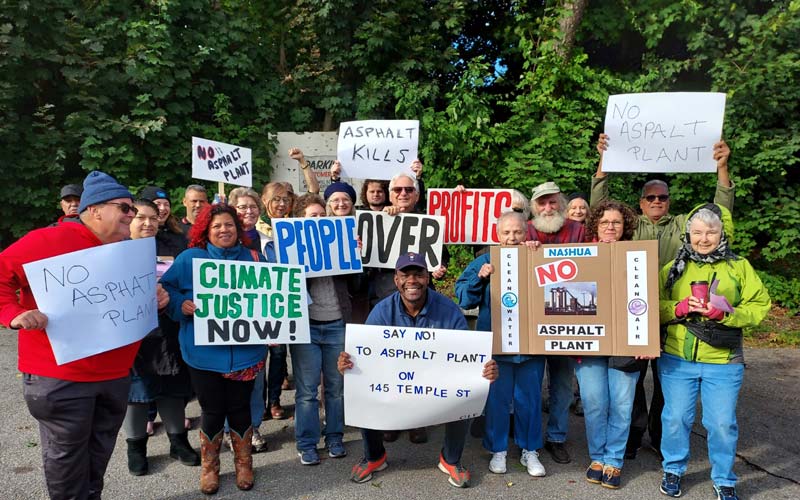
No asphalt plant will be in town – a victory underscoring the power of community advocacy. Photo: Courtesy of GSOP.
On July 9, Newport Construction Company dropped its lawsuit challenging Nashua’s rejection of a proposal to build a polluting asphalt plant. Amid pushback from residents, government actors, and interested organizations, including CLF, the Nashua Planning Board pointed out that the plan was inconsistent with the community’s character. The company’s withdrawal means the city’s decision stands: Nashua has defeated the asphalt plant for good.
This is a victory for those in Nashua who stood up to demand safe air to breathe and to protect the neighborhood’s health, safety, and quality of life – proof that the collective will of a community can prevail when all voices are given the chance to be heard.
– Heidi Trimarco, CLF’s staff attorney.
The Problem
When developers submitted a proposal to build an asphalt plant in Nashua’s East Hollis neighborhood, residents swiftly opposed this polluting facility. They were ready to fight to protect their health, safety, and quality of life.
The proposed location truly made this project outrageous. The asphalt plant would have been built in an environmental justice community, home to many immigrants and people of color. In addition to being dirty and noisy, the facility would have brought hundreds of heavy diesel trucks to the neighborhood daily, worsening air quality. It would also have impacted critical healthcare centers, schools, and daycares.
East Hollis residents already faced various environmental threats, racial injustice, and pollution-caused health problems, such as asthma and cancer. The asphalt plant would have worsened all of these issues.
CLF in Action
From the outset, community members fiercely opposed the proposal by attending Planning Board meetings. But the public hearings lacked interpretation services for non-English speakers. That’s where we first stepped in.
CLF worked alongside community partners to facilitate language interpretation services during public discussions. This helped ensure concerned residents with limited English proficiency could fully participate and voice their opinions.
In 2023, Nashua’s Planning Board unanimously rejected Newport’s proposal, explaining that its vision for the East Hollis neighborhood—to promote pedestrian use and public transit—wouldn’t align with constructing an asphalt plant. Despite widespread opposition to the proposal, Newport Construction appealed the decision in court.
Victory: No Asphalt Plant for Nashua
We made ourselves clear: Our community shouldn’t bear the environmental burdens of hosting this dangerous asphalt plant. CLF joined the City of Nashua to defend its decision before the New Hampshire Supreme Court.
Now, Newport Construction has withdrawn its appeal. The Planning Board’s decision stands: No asphalt plant will be in town – a victory underscoring the power of community advocacy.
“We hope this is just the start of addressing historic patterns of health disparities caused by environmental racism,” said Sarah Jane Knoy, executive director at Granite State Organizing Project – a faith-based grassroots organization that partnered with CLF to defend the community from this polluting plant. Overall, this case highlights the ongoing need for stronger environmental justice measures.
Next Steps: Cumulative Impacts Law in New Hampshire
While the community defeated the asphalt plant, this project exemplifies just one of the many battles Nashua residents must endure. To prevent similar threats in the future, New Hampshire needs a cumulative impacts law. Such legislation would allow for a comprehensive assessment of how new projects would impact a community when combined with existing threats. The area already hosts the Four Hills Landfill, a significant source of environmental pollution. Additionally, over 300 asbestos disposal sites in nearby communities pose health risks due to the potential release of toxic fibers.
CLF is collaborating with our partners to pass this critical law in our state. New Hampshire is the only state in New England without an environmental justice law – a necessary step to address historical environmental harms. Your voice is essential in this effort. Let our elected officials know you support stronger laws to protect our communities from disproportionate environmental burdens. Together, we can ensure a healthier, more just future for all communities in New Hampshire.



